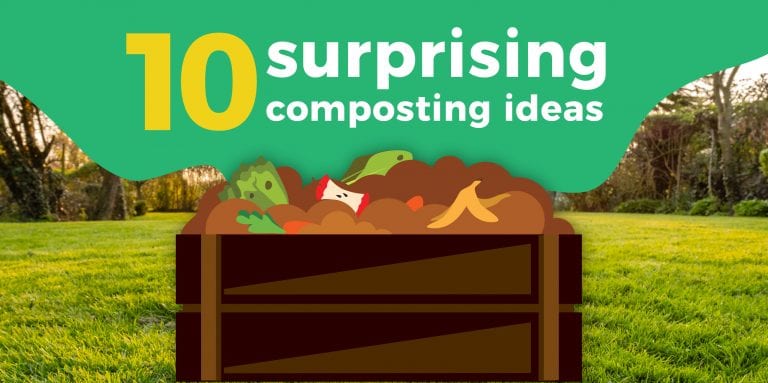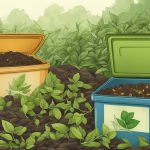It’s important to use compost in moderation in vegetable gardens, as excessive use can lead to nutrient imbalances, water retention problems, and pollution. To promote healthy plant growth, it’s essential to use compost regularly throughout the year instead of using too much at once.
Using excessive amounts of compost can hinder plant growth instead of promoting it. Compost is rich in nutrients, and while plants need these nutrients to thrive, an excess can result in an imbalance.
This can lead to nutrient toxicity or deficiencies, ultimately impacting the plant’s overall health.
Additionally, an excess of compost can retain too much water, causing issues such as root rot or drowning the plants. Striking the right balance and using compost in appropriate quantities is key to reaping its benefits without causing harm.
What Is the Key Role Of Compost In Gardening?
Compost is an invaluable resource for gardeners, playing a crucial role in providing essential nutrients to plants. Unlike synthetic fertilizers that often contain harmful chemicals, compost is rich in organic matter, including nitrogen, phosphorus, and potassium, which are vital for plant growth.
When added to the soil, compost slowly releases these nutrients over time, ensuring steady nourishment for plants.
This slow-release property prevents the risk of nutrient burn, which can occur when excessive amounts of synthetic fertilizers are applied, potentially damaging plant roots.
Aside from its nutrient content, compost also offers significant benefits in terms of soil structure and drainage. Garden soils that lack organic matter tend to become compacted, hindering the movement of air, water, and nutrients.
By incorporating compost into the soil, its gritty texture loosens compacted soils, improving the overall structure.
Furthermore, the organic matter in compost acts as a sponge, enhancing both water-holding capacity and drainage. It helps retain moisture during dry periods, reducing the frequency of irrigation and preventing waterlogging during heavy rainfall.
This improved drainage ensures that plant roots have a healthy environment, reducing the risk of rot and other water-related issues.

What Is The Right Way To Use Compost In Your Garden?
Compost is a gardener’s best friend. It’s packed with nutrients that nourish plants, improve soil structure, and enhance overall plant health. However, just like anything else, moderation is key. Using too much compost can have negative consequences for your garden.
So, let’s dive into the guidelines for determining the appropriate amount of compost to use-
Determining The Appropriate Amount Of Compost To Use
When it comes to using compost in your garden, it’s crucial to find the right balance. Using too little compost may not yield the desired results while using too much can create unforeseen issues.
Here are some guidelines to help you strike a perfect balance:
- Consider the quality of your existing soil: Start by assessing the quality of your soil. Is it clayey, sandy, or loamy? Is it nutrient-depleted or rich? This evaluation will give you an idea of how much compost your soil can handle. Generally, incorporating 1 to 3 inches of compost into the top 6-8 inches of soil is a safe bet for most gardens.
- Understand the needs of your plants: Different plants have different nutrient requirements. Research the preferred nutrient levels for the types of plants you’re growing. This will help you determine how much compost you need to add to fulfill their needs without overdoing it.
- Consider the compost’s maturity: Compost that is well-aged and fully decomposed has a higher nutrient content. If your compost is relatively fresh, it’s wise to use it in smaller quantities.
- Observe your plants’ response: Pay attention to how your plants respond to compost amendments. If they seem to thrive and show signs of healthy growth, then you’re on the right track. If, on the other hand, they exhibit signs of nutrient burn or stunted growth, you may need to reduce the amount of compost used.
How To Incorporate Compost Into The Soil Effectively?
Now that you have an idea of how much compost to use, it’s time to focus on how to incorporate it into your soil effectively. Follow these tips to make the most out of your compost:
- Before adding compost, remove any weeds or debris from the area. This will ensure that the compost can work its magic without competition.
- Mix the compost thoroughly with the topsoil. Use a garden fork or a tiller to blend the compost evenly. This will help distribute the nutrients throughout the soil and prevent clumping.
- Apply compost in layers. Rather than dumping it all in one spot, spread a layer of compost and gently work it into the soil. Repeat this process until the desired amount is incorporated. Ensuring even distribution of compost will result in consistent improvement across the entire garden bed.
- Water the area well after incorporating the compost. This will help the compost settle into the soil and activate its nutrient-releasing properties.
- Monitor the soil moisture levels. Compost can retain moisture, so be cautious not to overwater. Regularly check the soil moisture and adjust your watering regimen accordingly.
How Excessive Compost Leads to Nutrient Imbalances In The Soil?
Using excessive amounts of compost can disrupt the delicate nutrient balance in the soil. While compost contains valuable nutrients, such as nitrogen, phosphorus, and potassium, an excess application can lead to nutrient imbalances that can adversely affect plant growth.
When too much compost is added, the nutrients released from the decomposition process may exceed the plants’ needs, resulting in an oversaturation of certain nutrients.
This oversaturation can lead to nutrient imbalances, where certain nutrients become disproportionately abundant while others may become deficient.
For example, excessive nitrogen from compost can promote excessive vegetative growth at the expense of fruit or flower production, affecting the overall health and productivity of plants.

Signs Of Overusing Compost In Your Garden
Compost is undoubtedly beneficial for your garden, providing essential nutrients and improving soil structure. However, it is important to remember that moderation is key when it comes to composting applications. Using too much compost can have negative consequences for your plants and soil. In this section, we will explore the signs that indicate excessive compost usage in your garden.
Identifying Visual Cues That Indicate Excessive Compost Application
Excessive compost application can manifest through several visual cues that suggest a need for adjustment in your gardening practices. One noticeable sign is an overly thick layer of mulch covering the soil, which, while beneficial in moderation, can lead to excessively moist conditions that are unfavorable for your plants.
An abundance of weeds is another indicator, as nutrient-rich compost can inadvertently stimulate weed growth. Crowded plants struggling for space may signal overuse of compost, as the excessive nutrients lead to overly vigorous growth.
Nutrient imbalances can become apparent in your plants, with symptoms like chlorosis (yellowing of leaves) resulting from excessive nitrogen. High salt concentrations in compost may cause leaf-tip burn, indicating poor water uptake.
Stunted growth can also occur when excessive compost hampers root development, impeding water and nutrient absorption.
Finally, an overuse of compost can lead to an untidy garden appearance, creating clumpy and disorganized soil.
Monitoring these visual cues can help you optimize your compost application for healthier and more balanced plant growth.
| In Brief Signs of Overusing Compost: |
|---|
| Thick layer of mulch |
| Excessive weed growth |
| Crowded plants |
| Yellowing leaves (chlorosis) |
| Leaf-tip burn |
| Stunted growth |
| Unkempt and messy appearance |
How You Can Balance Compost Usage For Optimal Results?
Using compost is an excellent way to improve your garden‘s soil fertility and overall plant health. However, like most things in life, balance is key. While compost provides numerous benefits, using too much can have negative effects on your plants.
Strategies For Finding The Right Balance Between Compost Application And Plant Needs
When it comes to using compost, finding the right balance is essential to avoid potential issues such as nutrient imbalances or excessive moisture retention. Here are some strategies to help you achieve optimal results:
- Start with a soil test: Before applying compost, it’s crucial to understand your soil’s nutrient composition. A soil test can provide valuable insights into any deficiencies or excesses that may exist.
- Follow recommended compost application rates: Compost application rates typically vary depending on the type of plants you are growing. Consult reputable sources such as gardening guides or local agricultural extension offices for specific guidelines.
- Observe your plants closely: Pay attention to how your plants respond to compost application. If you notice signs of over-fertilization, such as yellowing leaves or stunted growth, it may be an indication that you are using too much compost.
- Adjust compost application based on plant growth stage: Different plant growth stages may have varying nutrient requirements. As plants mature, their need for compost may change. Monitor your plants’ growth and adjust compost application accordingly.
- Consider the overall nutrient balance: While compost is rich in organic matter and many essential nutrients, it may not provide all the nutrients plants need in the right proportions. Supplementing compost with other fertilizers or organic amendments can help achieve a balanced nutrient profile.
Specific Requirements Of Different Plant Varieties
Every plant has unique needs when it comes to nutrients, water, and overall growing conditions. Understanding the specific requirements of different plant varieties is crucial in achieving optimal balance in compost usage. Here are some factors to consider:
| Key Consideration | Description |
|---|---|
| Plant Type | Varying nutrient preferences among plant types; adjust compost rates accordingly. |
| Native Habitat | Consider plant’s origin; adapt compost amounts based on native soil conditions. |
| Life Cycle | Adjust compost rates to match the plant’s current growth stage (vegetative, flowering, fruiting). |
| Soil Conditions | Compost usage aligned with soil characteristics (pH, texture) for optimal nutrient delivery. |
Frequently Asked Questions On Can You Use Too Much Compost
Can You Use Too Much Compost In Your Garden?
Using too much compost can harm your garden. While compost is beneficial for soil health, excessive amounts can lead to nutrient imbalances and waterlogging. It’s best to follow recommended guidelines and use compost in moderation to maintain a healthy and thriving garden.
What Are The Consequences Of Using Excessive Compost?
Using excessive compost can disrupt the balance of nutrients in your soil, leading to nutrient imbalances that can hinder plant growth. Additionally, excess compost can cause waterlogging, depriving plant roots of oxygen and leading to root rot. It’s important to use compost in moderation to avoid these issues.
How Much Compost Should I Use In My Garden?
The amount of compost to use in your garden depends on several factors, including the type of plants you’re growing and the condition of your soil. As a general guideline, a layer of compost about 2-3 inches thick is usually sufficient.
However, it’s always a good idea to refer to specific recommendations for your specific plants and soil conditions.
Conclusion
To sum up, while compost can significantly enhance soil fertility and nourish plants, it is important to strike a balance when using it. Excessive application of compost can lead to nutrient imbalances and hinder plant growth. By following recommended guidelines and considering factors like soil type and plant requirements, you can avoid using too much compost and ensure optimal results for your garden or farm.

I am a graduate of Bangladesh Agricultural University, where I delved into various agricultural disciplines, equipping me with a profound understanding of agriculture. Beyond academics, I have hands-on experience in gardening and crop cultivation. My passion is to embrace sustainable farming and horticulture. With a BSc in Agriculture, I am dedicated to promoting environmentally conscious and efficient agrarian practices.
Bachelor of Science (BSc) in Agriculture (Hons.)
Master of Science. (Sustainable Agriculture & Food Security ) (MS)
Bangladesh Agricultural University



